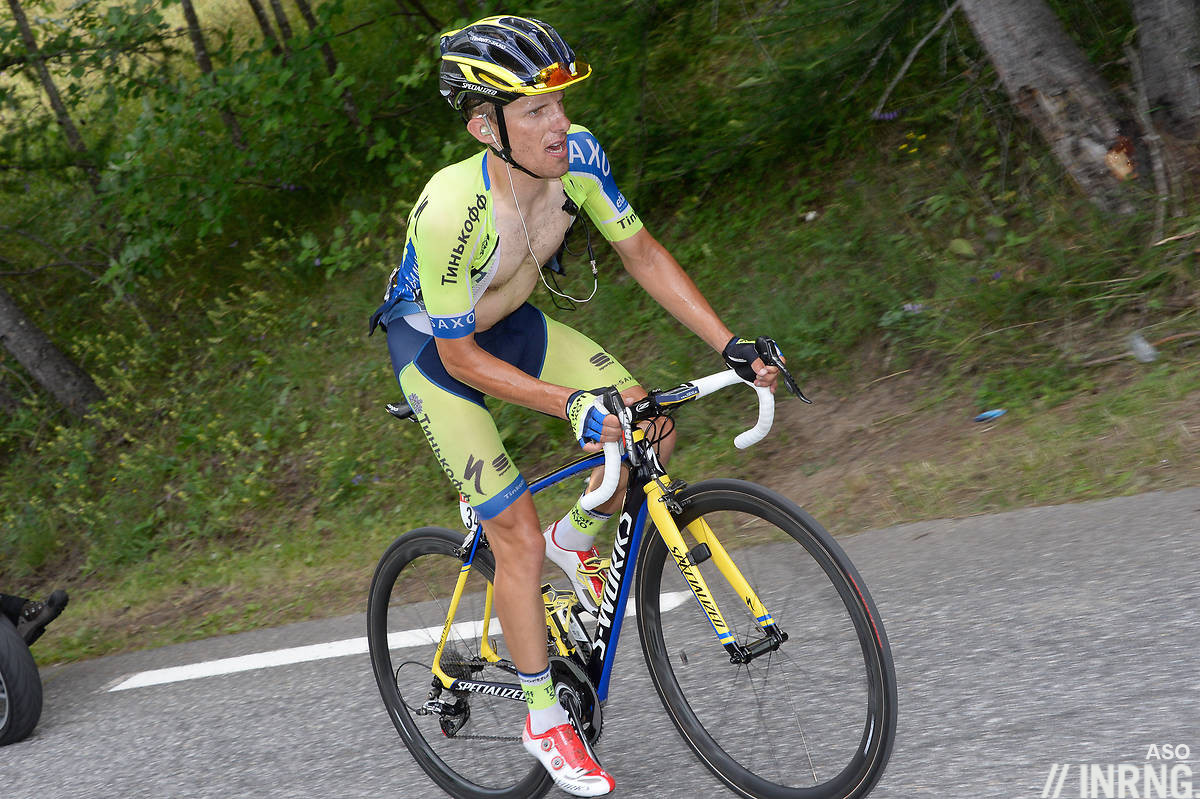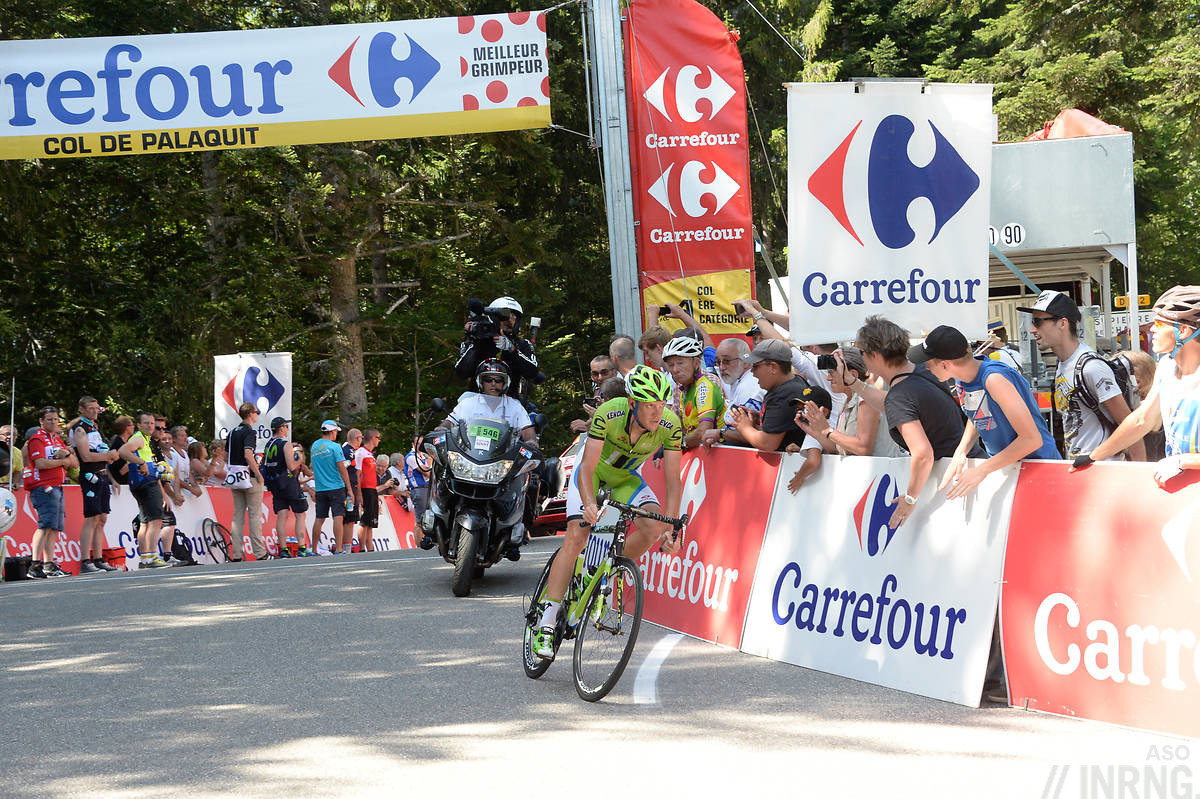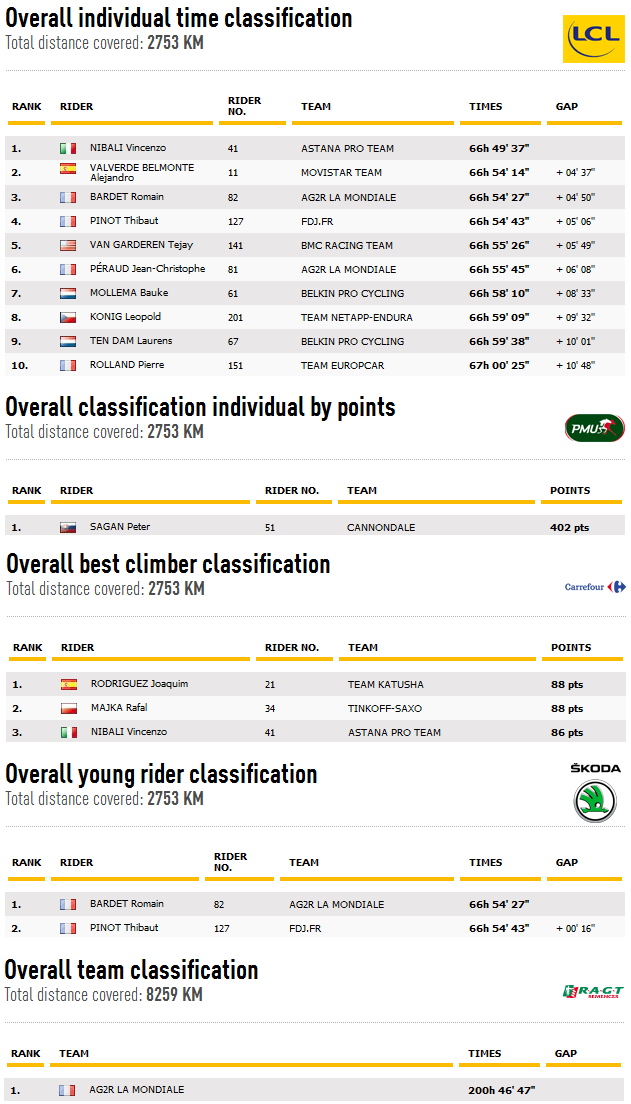The first of a Pyrenean trilogy, today’s stage is a marathon effort with its distance and the HC climb and descent of the Port de Balès saved for last.
The Route
- Km 25.0 – Côte de Fanjeaux, 2.4 kilometre-long climb at 4.9% – category 4
- Km 71.5 – Côte de Pamiers, 2.5 kilometre-long climb at 5.4% – category 4
- Km 155.0 – Col de Portet-d’Aspet (1 069 m), 5.4 kilometre-long climb at 6.9% – category 2
- Km 176.5 – Col des Ares, 6 kilometre-long climb at 5.2% – category 3
- Km 216.0 – Port de Balès (1 755 m), 11.7 kilometre-long climb at 7.7% – category HC
The longest stage of the race. For contrast, the ride today just to get to the intermediate sprint in St Girons and the start of the Pyrenees requires 123.5km and tomorrow’s entire stage is 124.5km long.
The flat first section isn’t too remarkable but it is exposed and this is often windy territory with the Tramontane blasting across the plains of the Lauragais. The forecast isn’t for anything too strong but it’s enough to make it hard for riders with wooden legs after the rest day.
The Portet-d’Aspet is longer than listed, at least there is climbing to do before it starts. It’s a good warm-up, the 7% slopes are enough to start slimming down the bunch and a typical Pyrenean back road although on oddity because the “summit” is a village rather than a remote crossing over a ridge. The descent is different, a much larger road and fast. The race will pass the Fabio Casartelli memorial.
The Col des Ares is unremarkable, it’s reasonable wide and the 5.2% average seems to be the maximum gradient too. With sections at 3-4% it’s a climb to take in the big ring and allows the race to cross the Comminges area of the Pyrenees before dropping into the Garonne valley. Here the race could turn left and follow the river and railway line up to the finish in Luchon… but there’s a HC climb instead.

The climb is listed above as starting in Ferrère but it starts rising well before. So the 11.7 kilometre-long climb at 7.7% is only the final section of the climb, it takes a little effort up 4-5% slopes to get to the start. Once the official climb begins it only gets harder. The profile above shows the changing gradients but doesn’t do it justice. This is a very hard climb because of the ever-changing gradient.
The descent isn’t so difficult but it is fast with long straight sections and a few technical parts. Taking 15km to lose the height previously gained in 11, a group can travel much faster than a lone rider, profiting from slipstreams. It’s exactly the place where riders will try to test Thibaut Pinot.

The Finish: it’s downhill into town but levels 0ut in Luchon just after the signs to mark the entry into the town. The race turns through the streets with a sharp left-hander with 200 metres to go, who ever wants to win needs to go into this bend
- Say it: Bal-esse, where bal- rhymes with pal
The Scenario
Riders and managers might like to repeat the mantra of “taking the race day by day” but it’s impossible to ignore the trifecta of Pyrenean stages. Today is so long and tomorrow’s stage so short that anyone finishing today with especially heavy legs risks paying the price. Translation: no long range efforts from the big names. We could see action on the final climb but before seems unlikely.
Instead it’s a good day for a breakaway. As long as there’s nobody dangerous they have a long time to build up a lead on the way to the final climb and the summit of the Port de Balès is a virtual finish line, get over the top with 30 seconds and the stage is yours.

The Contenders
Joaquim Rodriguez and Rafał Majka are both in the hunt for the polka dot mountains jersey. But they might prefer to retreat today in order to attack better tomorrow. The HC Port de Balès does offer plenty of points but Wednesday and Thursday’s stages offer HC stage finishes where double points are on offer. Instead of Majka, Tinkoff-Saxo could use Michael Rogers and Nicolas Roche.

Alessandro de Marchi could try here. I’m not convinced he can match Rodriguez and Majka in a straight uphill contest so a raid today might suit him better. Other long distance specialists include Michał Kwiatkowski, Jan Bakelants, Nicolas Edet, Simon Clarke, Brice Feillu and Sylvain Chavanel Katusha pairing Simon Špilak and Yury Trofimov could be worth watching, if only because Špilak was climbing second to Chris Froome in the Tour de Romandie while Trofimov will enjoy the final descent.
Thomas Voeckler? He won here in 2010 after a solo breakaway but seems to be chasing his tail in this race. Never say never but he’s 35 and even he admits it’s not as easy as it once was. Sky are in the usual position of infiltrating breakaways and so far we’ve seen Geraint Thomas and Mikel Nieve in the mix, maybe the long day suits Vasil Kiriyenka?
Offence could be the best form of defence for Vincenzo Nibali. Why worry about someone falling in front of you on the final descent when you go up the road and relax, or at least chose your own line. The Italian hasn’t worried about economising energy so far and of course he’s famous for his descending, he might not even need to attack to drop the others on the descent to the finish. Otherwise Alejandro Valverde could be the best of the rest in a sprint but a little known fact is just how fast Romain Bardet can sprint too. Maybe Pierre Rolland and Leopold König are given some space on the Port de Balès?
| – | |
| Vincenzo Nibali, Alejandro Valverde | |
| Nicolas Roche, Michael Rogers | |
| Alessandro de Marchi, Romain Bardet | |
| Kwiatkowski, Rolland, König, Špilak, Feillu, Kiriyenka |
Weather: sunshine and clouds with cool temperatures at altitude and a top temperature of 22°C in the valleys. The Tramontane wind provides an awkward crosswind for the first hour, nothing fierce but up to 30km/h.
TV: coverage starts live around 2.00pm Euro time. The Col de Portet-d’Aspet starts around 3.00pm, the Port de Balès around 4.15pm and the finish is due an hour later.



The stage is 237.5 Km long. First para after ‘the route’. Sorry to be pedantic inrng on your excellent blog.
This time I was trying to point out how the intermediate point today, before the mountains arrive, is as long a ride as tomorrow’s whole stage.
First time in the Pyrenees post Euskatel. It will be different without the inevitable onslaught of attacks of the men in orange.
I am missing the stage 15 wrap! I was looking forward to your exellent analysis of the most exiting finish of this years tour! :'(
Covering the stage would be a bit stale by now, the events are old. It was a good sprint and a thrilling finish but not too instructive otherwise. As many have said already Kristoff might not be the fastest normally but he’s one of the freshest, Kittel looks broken after the Alps in particular. It’s worth reviewing the video to see how Sagan cuts through the field in the finish, he might like Stage 19.
No summary of stage 15?
Personally I don’t mind the “missing” wrap-up as much as the no mention for the gutsy ride of Jack Bauer. Cycling can be so cruel sometimes!
When Kristoff got the right position in the sprint, he is very fast. The problem when he don’t get the victory, is often a bad position, or to take the position alone tired he’s legs. I think it is hard to beat him when he start the sprint from the front, and its not 400m to go, like on stage 4.
Do you know if anything’s planned to commemorate Casartelli today?
Not seen anything but I suspect Christian Prudhomme will stop and pay tribute.
+1
Inrng- heck of a call on the composition of the break today!
Indeed, of those mentioned in the preview, the following feature:-
Kiriyenka, Kwiatkowski, Rogers, Voeckler and Bakelandts.
Not bad going Inrng!
And Rogers 3* for the win. And Kirienka coming in 3rd. Very impressive.
Port de Balès is very beautiful. I rode it from the Mauléon-Barousse side in ’97, found it a really tough climb, with a fabulous sweep from right to left at the top. It was just a track then, and I was delighted and amazed when it turned up in the 2007 Tour.
I love the area around Luchon. The Port de Bales is a tough descent in the beginning switchbacks and the right hand 90 turn in St Paul D’Oueil. Voeckler fishtailed around it when he last won this stage. I was lucky enough to climb the Port de Bales just after they paved it and it was still closed to cars! Heaven!
+1 Philip